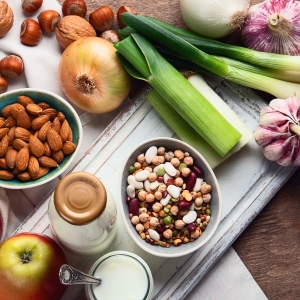The microbiota is made up of approximately 10 trillion bacteria, fungi and other organisms that live in our bodies, mainly in the digestive tract. The majority of these are beneficial; however, with modern lifestyles the mix of these may not be as beneficial as they could be.
 The gut has what we call a microbiota (a wealth of bacteria) with part of this made of beneficial gut bacteria, known as probiotics. Probiotics are live microorganisms which can pass on health benefits to us. It is the fibre in plant foods that are thought to act as food for these probiotics.
The gut has what we call a microbiota (a wealth of bacteria) with part of this made of beneficial gut bacteria, known as probiotics. Probiotics are live microorganisms which can pass on health benefits to us. It is the fibre in plant foods that are thought to act as food for these probiotics.
This food is known as a prebiotics and when they are broken down by the probiotics they are thought to turn to messenger molecules to the rest of the body. Research is ongoing but it looks like some of these messages are related to improved health including mood and mental health.
We think there is a two-way communication between our gut microbiota and our brain which is commonly referred to as the gut-brain-axis. What we think can happen is that our diets can modify the communication and could possibly mean that changing our diets may have an impact upon our mental health.
The research suggests that there are three ways that the gut and brain communicate – through our nervous system, blood and immune system. Studies are beginning to highlight that the gut bacteria can have an influence on the central nervous system which could mean mood. Specific probiotics have also been shown to improve mental health particularly in people diagnosed with depression which is where a lot of the research has been focused.
 The gut microbiota is also involved in how stress affects the body. We think that stress increases intestinal permeability which allows bacteria to travel across the intestinal mucosa which can lead to inflammation. High amounts inflammation in the gut can be linked to anxiety-like symptoms and depressive behaviours.
The gut microbiota is also involved in how stress affects the body. We think that stress increases intestinal permeability which allows bacteria to travel across the intestinal mucosa which can lead to inflammation. High amounts inflammation in the gut can be linked to anxiety-like symptoms and depressive behaviours.
One research study compared a group of people following the Mediterranean Diet which had 50g fibre in compared to a group who were given counselling. It found that the severity of depression was less in those who followed the Mediterranean diet with the higher fibre content. Another study found that adding a probiotic yoghurt into the diet of a group of individuals made them more resilient to looking at negative stimuli.
Although the evidence is still emerging it’s exciting to think we may be able to alter our diet to support with our own mental health and wellbeing. As with anything there isn’t one size fits all and so it’s important that we look after our own mental health via exercise, mindfulness and asking for support. Remember that the mental health foundation is here to help – www.mentalhealth.org.uk.
You can find Sarah on instagram @saraheldernutrition or go to saraheldernutrition.co.uk to find out more about her services.
References:
Foster, J.A. and Neufeld, K.A.M., 2013. Gut–brain axis: how the microbiome influences anxiety and depression. Trends in neurosciences, 36(5), pp.305-312.
Skarupski KA, Tangney CC, Li H, Evans DA, Morris MC. Mediterranean diet and depressive symptoms among older adults over time. J Nutr Health Aging. 2013;17(5):441-5.
Tillisch, Kirsten, Jennifer Labus, Lisa Kilpatrick, Zhiguo Jiang, Jean Stains, Bahar Ebrat, Denis Guyonnet et al. “Consumption of Fermented Milk Product With Probiotic Modulates Brain Activity.” Gastroenterology 144, no. 7 (2013): 1394-1401.
Zhu X, Han Y, Du J, Liu R, Jin K, Yi W. Microbiota-gut-brain axis and the central nervous system. Oncotarget. 2017;8(32):53829-53838. Published 2017 May 10. doi:10.18632/oncotarget.17754
Note: All information is written for general population and not specific conditions. Always consult your doctor or Dietitian
About Sarah Elder



Leave a Comment: